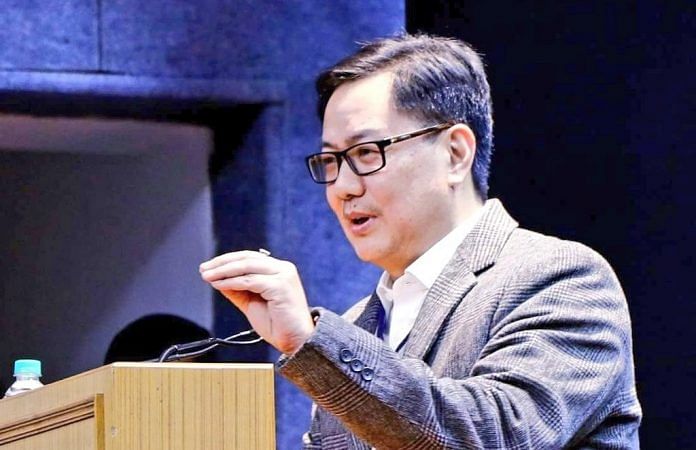The junior home minister says the govt has implemented all the recommendations of the Bezbaruah committee, but inserting provisions in the IPC will take longer.
New Delhi: The government has done all it can to ensure that people from northeastern states don’t face any race-related problems in metropolitan cities, minister of state for home affairs Kiren Rijiju has told ThePrint.
Rijiju said the government has implemented all recommendations of the M.P. Bezbaruah committee, which was formed to find solutions following the 2014 murder of Nido Tania, a student from Arunachal Pradesh, in Delhi.
The murder had led to large-scale protests by students from northeastern states and activists, who alleged that this was the latest example of racist crimes against people from the region in big cities such as New Delhi, Mumbai and Bengaluru.
“Most recommendations have been implemented, but certain long-term recommendations, like including a syllabus under UGC, will take time,” Rijiju said, referring to the University Grants Commission, which decides higher education curricula for institutes across the country.
A Special Unit for the North Eastern Region (SPUNER) has been created in the Delhi Police, with 400 recruits from the region and its own spacious office complex, Rijiju said. “These were unthinkable a few years back. There is no special unit for any other state in India,” he said.
However, the efficiency of the special unit has declined in the year and a half since Joint Commissioner of Police Robin Hibu, who belongs to Arunachal Pradesh, vacated the position of nodal officer, some student activists claimed.
“It’s just a different style of working. But since Hibu took the initiative, cases have decreased and the police are also more sensitised,” said an activist who was part of the Bezbaruah committee consultations and spoke on condition of anonymity.
Insertions in IPC
One of the strongest recommendations of the committee headed by Bezbaruah, a former Assam cadre IAS officer, was to include racist crimes in the Indian Penal Code (IPC), under sections 153 (provocation with intent to cause riot) and 509 (insulting the modesty of a woman).
The committee proposed a Section 153C, which would deal with imputations and assertions prejudicial to human dignity, and Section 509A, which would pertain to a word, gesture or act intended to insult a member of a particular racial group or of any race.
Addressing demands to legislate an anti-racist law, the committee said formulating a new law would be a much lengthier process and suggested safeguards that would be immediately applicable.
“Unless you have a provision in the act, when you go to the police, they will simplify the crime by calling it ‘teasing’ or ‘taunting’. Unless they have done anything physical or killed you, we cannot take any action,” Bezbaruah told ThePrint.
At present, while constitutional provisions clearly prohibit discrimination on the basis of race, there is no provision in the IPC that addresses racially-motivated crimes. This also limits the study of such criminal behaviour in the country to anecdotal records, experts said.
Way forward
Asked how long the recommendations on adding provisions in the IPC would take, Rijiju said the Centre has been waiting for a response from the states.
“Most states have not responded. I personally have reminded state governments to give their opinion as early as possible,” the minister said.
On 18 April, home ministry officials met the monitoring committee formed to oversee the implementation of the recommendations. An official who did not wish to be named said the ministry is finalising a comprehensive bill for inserting new sections and is holding consultations with state governments and law agencies.
The process is taking time because the kind of political pressure seen in 2014 is missing, activists said.
“There is no pressure now because the government has assured it is implementing the recommendations. It’s slow, but they are doing it,” Bezbaruah said.



